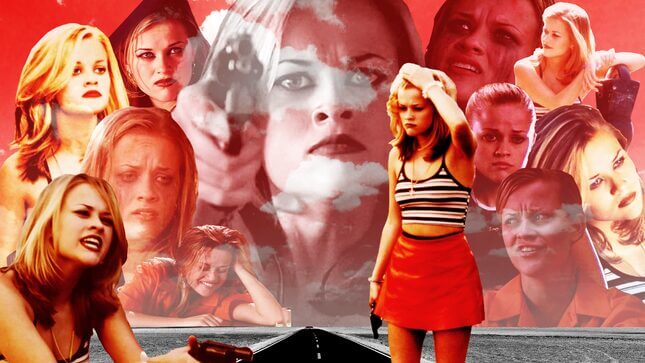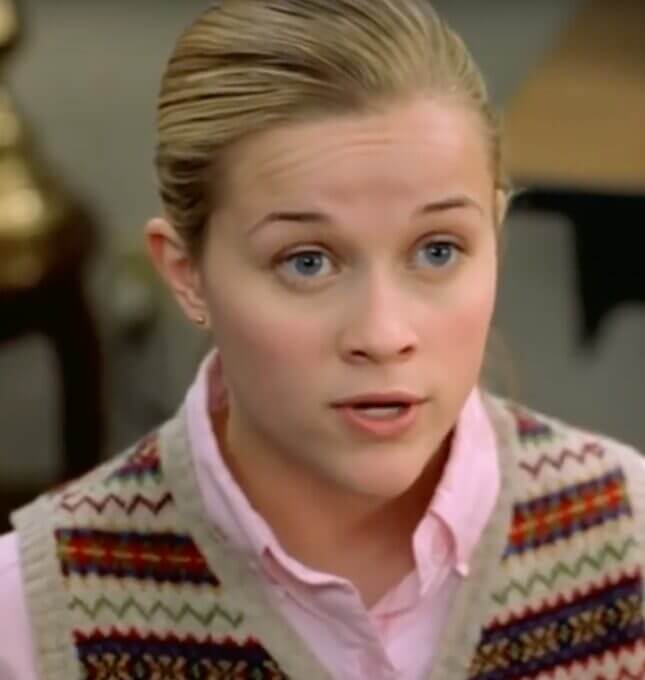
Illustration: Elena Scotti
In 2001, Reese Witherspoon, as Elle Woods, became the cheerful face of pink feminism. Elle was an offshoot of Election’s Tracy Flick, a pathologically cheerful Type A achiever, but with all of Election’s dark edges rubbed off, replaced by sequins and scented résumés. As a teenager, I came away from seeing Legally Blonde in the theater a little disappointed. For years, I’d been a fan of weird indie movie Reese Witherspoon, who swore, smoked cigarettes, and slashed bad men’s stomachs open with a knife crafted from a filed-down toothbrush. For a brief, golden period early in her career, Witherspoon played complicated characters somewhere in between villains and heroes. She was great at it, and it’s a shame success meant simplifying her characters.
When director Matt Wright was filming his 1996 fairytale-meets-serial killer comedy Freeway, he said the first day on set, watching a 20-year-old Reese Witherspoon’s performance was a “revelation” akin to seeing “Jimi Hendrix at the Whisky A Go-Go.” In the film, Witherspoon is like a sweet but feral cat, big-eyed and docile one minute, screeching and clawing the next. In one scene, she’s shooting a man in the neck. In the next, she’s looking to the heavens, telling Jesus she loves him. The role is a far cry from the sweet blonde ingenues she would play in the big-budget movies of the early 2000s and the prestige role in Walk the Line that would win her an Oscar. But Freeway was also some of Witherspoon’s most interesting acting, allowing her to get mad and lose control, a side we wouldn’t see again until recently when Witherspoon began producing her own projects.
Freeway re-tells the story of Little Red Riding Hood from a ’90s perspective, with Witherspoon’s character, Vanessa Lutz, on the run to her grandmother’s house after her drug-addicted mother is arrested for solicitation. After her car breaks down, big, bad Bob Wolverton (played by Sutherland), a serial killer, targets Vanessa as his next victim. But before he can “do sex to her dead body,” as Witherspoon’s character puts it, she shoots him with a pistol given to her by her drug-dealing fiancé, Chopper. The movie still shows on B-movie nights at arty theaters; in fact, I recently re-watched it at Brooklyn’s Alamo Drafthouse, where the audience of twenty-something Brooklynites laughed and cheered the strange funnel of violence and chaos that ensues after Bob Wolverton survives the shooting.
The one-note characters she would go on to play in more successful movies… didn’t do half as much to demonstrate her range.
It is a bad movie, both intentionally and unintentionally. On one hand, Freeway is a fun homage to the sexy, paranoid 1950s juvenile delinquent morality plays, like Ed Wood’s The Violent Years, perfect set during the mid-’90s panic over gang violence and drugs, when a terrified upper middle class clamored to try teenage “thugs” as adults. On the other hand, the film tries too hard to compete with the worst parts of its more successful contemporaries, indie hits like Reservoir Dogs and Pulp Fiction, which relied on faux-edgy racism and misogynistic stereotypes for humor rather than confronting or challenging any of these shitty worldviews.
But in Freeway, Witherspoon is absolutely the revelation that Wright saw on set the first day of filming. She is at once furious and sweet, a child who has seen too much yet is somehow still incredibly naive. In one scene, she trusts Bob Wolverton with the story of her childhood sexual abuse and recounts being made to feel like a human toilet by her stepfather with hard expression and a quivering voice in a way that seems to be playing two characters at odds with one another. Watching her innocently say that the abuse made her feel like she’s got “Daddy’s little fuckhole” tattooed on her forehead is similar to watching a pianist who can play one song with their left hand and a different tune with their right. Moments later, the man she’s trusted with her story attacks her as well, and she declares, “Mister, I’m a person. I’m human being,” as she pulls a gun and as if she’s both informing him and realizing it for the first time. The one-note characters she would go on to play in more successful movies, beginning with Cruel Intentions, in which she played the virginal heroine, didn’t do half as much to demonstrate her range as a character Witherspoon played when she was just one year out of her teens.
Following Freeway, something happened to the messy, out-of-control yet completely relatable Witherspoon character I’d first fallen in love with.
By the time Vanessa asks Bob if he “accepts Jesus Christ as his personal Lord and Savior” before shooting him in the neck, my mother and I were laughing so hard we could barely hear the lines. In court, where Vanessa has been charged with attempted murder after police refuse to believe that Wolverton attacked her first, she taunts the now-irrevocably mangled man who told her that her life didn’t matter. “Look at your little shit bag, Bob,” she says, pointing the colostomy bag he now has because she fought. My mother and I laughed so hard, tears streamed down our faces. My mom said we should really turn it off, but neither of us wanted to look away. We were utterly charmed by Vanessa Lutz’s anger at all the right men: her would-be rapist, her stepfather, the men who would knowingly pay a teenager for sex. I can call my mom at any time, day or night, and say, “Look at your little shitbag, Bob,” in Vanessa Lutz’s high-pitched twang, not too different from my real accent, and my mother and I still laugh at this shorthand for all the men we know who deserve exactly what they get.

After that, I was a full-fledged Reese Witherspoon fan, but following Freeway, something happened to the messy, out-of-control yet completely relatable Witherspoon character I’d first fallen in love with. There were hints in Pleasantville, in which Witherspoon played an ultra-’90s teenager plopped into a black-and-white sitcom. Election’s Tracy Flick was ruthless but sweet in a darker version of the calculated, Type-A way that would eventually become the central trait of most Witherspoon characters. Both are among my favorite of her films, but neither of them allowed her to really let go in the loud, messy way Freeway had. And by the time Legally Blonde and her Oscar-winning turn as June Carter Cash rolled around, Witherspoon had all but lost that Vanessa Lutz fury, replacing it with softer characters, all big eyes and determination. For the next 20 years, none of her characters would ever utter sentences like, “Yeah, well, I get claustrophobic sucking strange dick,” as she forced a john insisting he’s scared of small spaces into the trunk of a car at gunpoint with the charmingly feral rage of the mid-’90s indie-movie Reese Witherspoon.
In a recent interview with the Wall Street Journal, Witherspoon said she began her production company because the roles she was being offered were too dark: “There were [roles for] two women, and they were both deplorable, disgusting, horrible… I thought, this is my line in the sand. We women are too talented to be fighting over roles like this.”
But the roles she’s chosen lately, that of Madeline MacKenzie in Big Little Lies and The Morning Show’s Bradley Jackson, both TV shows she’s also produced, are much messier than the characters she played as Reese Witherspoon the rom-com queen. Madeline MacKenzie’s need for control is both her strength and her downfall, making her fiercely loyal but also driving away everyone she tries so desperately to protect. Like Vanessa Lutz, she aspires to take the moral high road but usually fails in light of a quicker path to what she needs. And those are very human failings, ultimately making for much more interesting characters than the ones Witherspoon played from the early 2000s until very recently who had no real flaws to speak of.
Bradley Jackson comes to the attention of The Morning Show team after giving an unhinged rant about coal to a man who calls her a bitch at a protest. It’s the closest I’ve seen Witherspoon come yet to the wild performances of her early career. Over the past two decades, she’s learned to speak in a deeper voice, and her Southern accent now sounds practiced with a dialect coach, but there’s still something lovely about watching her grab a man by the lapels and say, “I bet you don’t know jack shit about coal,” before launching into a rant that builds steam until it becomes unintelligible scream, a move she hasn’t tried since the ’90s but can still land perfectly. Now that she’s taken control of her career, her characters have become feral again.
Her first scenes in The Morning Show remind me very much of a scene at the end of Freeway, when Vanessa Lutz is pretending to sell sex in a border town so that she can rob a john for his car. When she pulls her gun on the man who, moments before, told her he had no problem receiving oral sex from a 16-year-old, she has him strip to the waist and stuffs him in the trunk of his own car. “Why are you doing this?” he tearfully asks her. “Because I’m pissed off, and the whole world owes me,” she screams back, sounding simultaneously like a petulant child and an enraged 40-year-old. It’s good to have feral Reese back. I’ve been waiting a really long time.